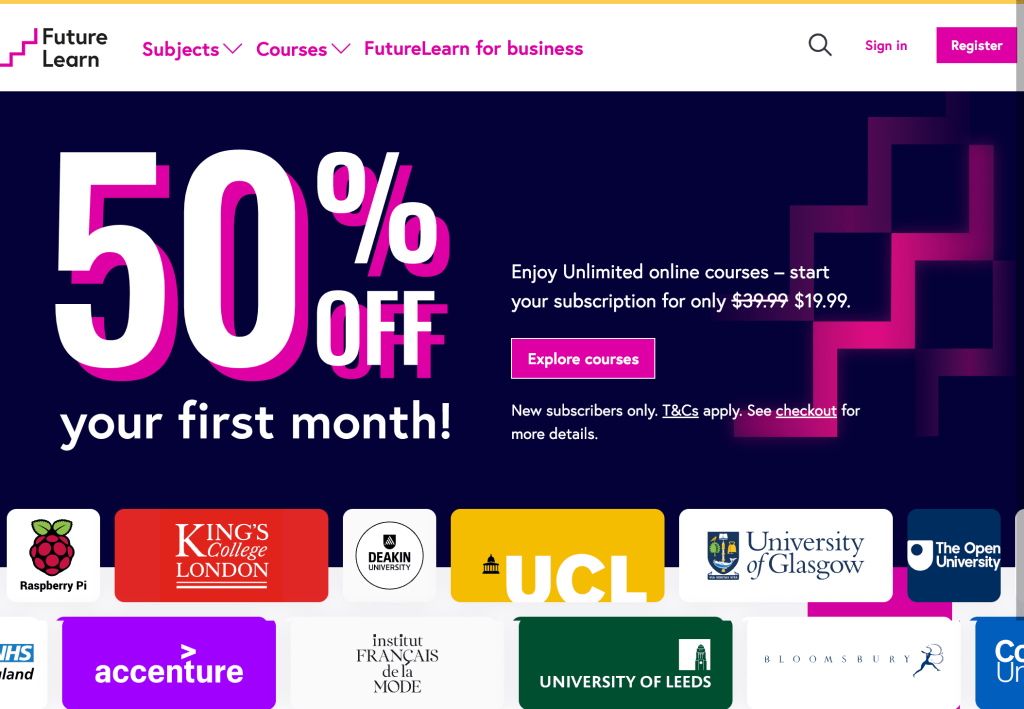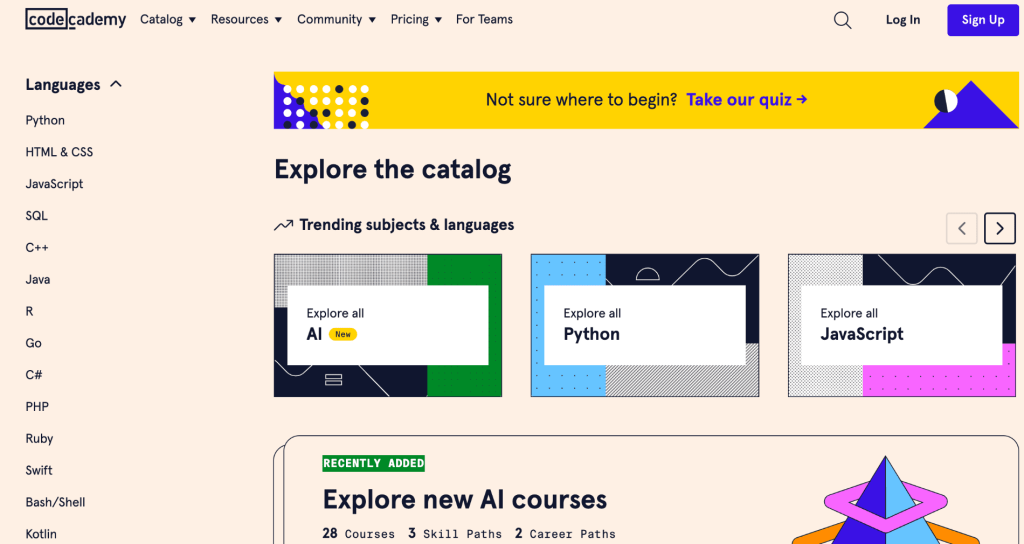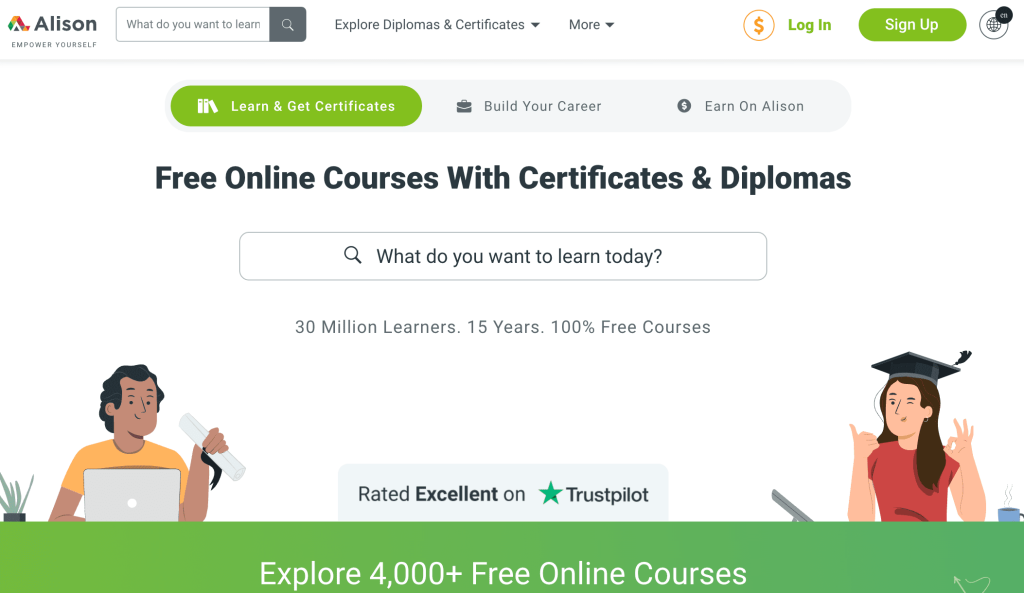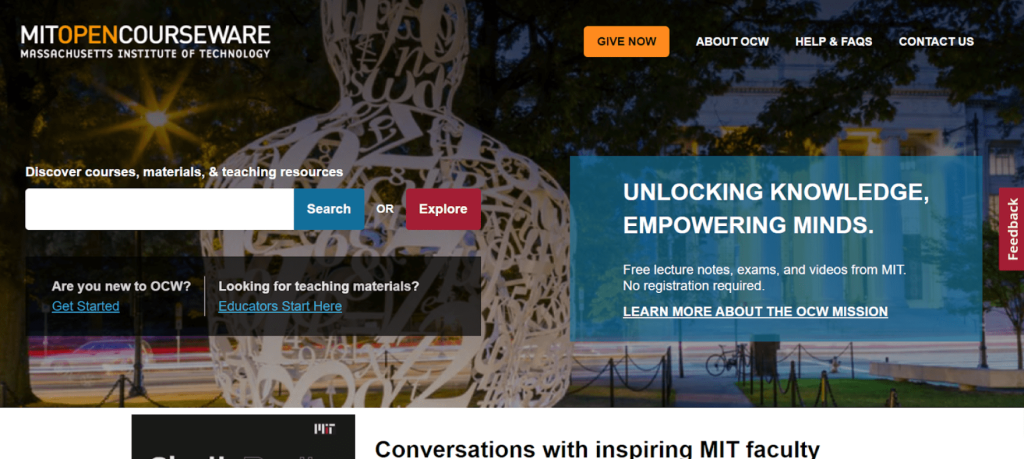Currently, the best Coursera alternative is LinkedIn Learning, which offers professional certified courses ideal for career advancement.
Other excellent options include edX for university-level courses, Udacity for tech skills, and Pluralsight for IT training. Most alternatives offer free plans or trials, such as Khan Academy, which provides completely free access. Meanwhile, platforms like DataCamp and Skillshare offer free trials.
In this guide, we will review the 12 top-rated platforms, covering detailed features, pricing, and their best use cases.
Top 12 Coursera Competitors & Alternatives: In a Nutshell
Before getting into Coursera competitors and alternatives, here is a quick list of these other Coursera alternatives:
| Sr. No. | Coursera Alternatives | Ratings | Best features/courses |
|---|---|---|---|
| 1. | LinkedIn Learning | 4.7/5 | Professional certified courses |
| 2. | Udacity | 4.6/5 (Avg.) | Tech-related courses |
| 3. | Pluralsight | 4.7/5 | IT courses |
| 4. | Udemy | 4.5/5 | Software related courses |
| 5. | Edx | 4.6/5 | Computer Science and Management |
| 6. | Khan Academy | 4.5/5 | Academic Learning |
| 7. | FutureLearn | 4.6/5 | Business courses |
| 8. | DataCamp | 4.5/5 | Software-related courses |
| 9. | Codecademy | 4.5/5 | Programming languages |
| 10. | Alison | 4.5/5 | Job-oriented skills |
| 11. | MIT OpenCourseWare | 4.4/5 | MIT courses and material |
| 12. | Skillshare | 4.2/5 | Hands-on learning experiences for creative professionals |
Let us have a detailed look at the best Coursera Alternatives:
1. LinkedIn Learning
LinkedIn Learning is an e-learning platform that offers a wide range of popular courses. It keeps users up-to-date on employment prospects and enables them to search for jobs while learning simultaneously.
Additionally, the platform provides comprehensive video lectures for each course to ensure accessibility for beginners.
Furthermore, LinkedIn Learning supports five languages in addition to English for non-English-speaking users. LinkedIn’s course library is well-equipped with lectures that are perfect for career advancement or building professional skills.
You can learn more with our LinkedIn Learning review.
Read our detailed comparison of Coursera vs. LinkedIn Learning.
2. Udacity
Udacity is a Massive Open Online Course (MOOC) provider that offers courses on various topics. Founded in 2011, it has over 1.5 million students and offers over 100 courses in computer science, programming, business, and data science.
Some courses include introductions to web development languages such as HTML5 and CSS3, as well as JavaScript, building iPhone apps using the iOS SDK, and more advanced topics like Artificial Intelligence: Foundations of Computer Vision or Deep Reinforcement Learning: An Introduction.
Get to know more about Udacity with our review.
3. Pluralsight
Pluralsight is one of the finest e-learning platforms, offering more than 7,500 courses taught by renowned and expert professors and instructors. One of the most unique features of Pluralsight is that it continually updates existing courses and introduces new, interactive programs.
This platform offers a variety of courses, such as machine learning, cloud computing, web development, Python, data science, and Java development.
Moreover, it offers specialized learning tracks that support learners’ progress from beginners to advanced levels. You can also take a skill IQ test that evaluates your skills and level, and then proposes relevant courses.
4. Udemy
Udemy offers a potpourri of affordable and high-quality courses. It is highly beneficial for those looking to acquire and learn new skills or polish their existing ones. Udemy offers over 213,000 courses in various categories, including business, personal development, software engineering, and photography.
Udemy courses are designed to suit one’s schedule and pace. After completing a paid course, you receive an official certificate acknowledging that you have completed it and lifetime access.
Dive into the details with our review of Udacity!
5. edX
edX is a nonprofit online learning platform that delivers courses from over 100 institutions. In 2012, edX was founded by Harvard University and the Massachusetts Institute of Technology (MIT) to provide high-quality learning experiences to learners everywhere.
edX offers more than 1,800 individual courses in a wide range of subjects, from Computer Science to Public Health, with new courses added regularly. The content is free, and although it’s not necessary, you can pay a fee to receive a certificate of completion after completing your coursework (the cost varies by institution).
You can explore in detail with our edX review where we have recommended the best courses, pricing, and more.
6. Khan Academy
Khan Academy is a non-profit educational website that provides practice exercises, instructional videos, and a personalized learning dashboard to help students study at their own pace in and outside of the classroom. It has been praised for its ability to offer free education to students around the world.
Sal Khan launched it in 2006 as an alternative method of teaching mathematics after he realized that his cousin Nadia’s math methods were not being taught in school.
Khan Academy offers thousands of practice problems across various subjects, including math, science, economics, and finance. Each topic contains different difficulty levels, so you can begin with basic tutorials before moving on to more advanced ones if you’re ready for it!
7. FutureLearn
FutureLearn is a social learning platform that offers free online courses from top universities and institutions worldwide. The platform has partnered with over 100 universities and organizations to offer more than 1,000 online courses in business, languages, health, and law.

Like other top MOOC providers like Coursera, FutureLearn will let you watch lectures and view study materials on your desktop computer or mobile device – but it also enables you to interact with fellow learners through forums and participate in peer-to-peer learning activities such as quizzes or surveys.
8. Datacamp
DataCamp is a learning platform that provides courses and certifications in data science, AI, machine learning, programming, and statistics. The classes are designed to help learners understand and apply the skills relevant to their respective fields.
The platform offers high-quality content, providing detailed information on coding exercises and related topics. It is an excellent platform for beginners who want to pursue a career in data science.
Datacamp also assists in job placements by helping with interview prep and providing personalized resume reviews. The certificates provided by Datacamp, in partnership with many industry leaders, are recognized globally. Datacamp’s methodology is to grasp, practice, apply, and assess.
Learn about the platform in detail with our in-depth Datacamp review.
9. Codecademy
If you are a coding enthusiast, Codecademy is for you. It offers more than 14 different programming languages, including Java, SQL, Python, HTML, C++, and many others, as well as ten subject areas, such as code foundation, web development, computer science, machine learning, and more.

Codecademy also offers free courses that you can try. But if you are genuinely committed to coding, you can try their individual premium plan, which provides career and skill paths. This platform also offers various courses on cybersecurity and is involved in real-world projects.
You can also have a look at our article on Codecademy vs Datacamp.
10. Alison
Alison is a UK-based online learning platform offering over 1,200 courses to students in over 190 countries. The platform focuses on business and technology, with a secondary focus on healthcare.
Unlike Coursera and other MOOCs, Alison does not offer subject-specific degrees; instead, it offers certificates in several areas of study, including project management and digital marketing.

It is also compatible with CMI qualifications as it offers courses structured similarly to them, such as the Professional Certificate in Management Accounting or the Diploma in Business Excellence.
Alison claims to offer open enrollment, but there are specific requirements for taking certain courses, such as having at least 600 hours of work experience for subjects like finance or IT.
However, it does not appear that you need any specific qualification for most subjects, so long as you meet the minimum professional requirements (which vary from the course).
11. MIT OpenCourseWare
MIT OpenCourseWare, or OCW for short, is a free publication of virtually all MIT course content. It includes materials from all academic disciplines, including the humanities, social sciences, physical sciences, and engineering.
MIT OpenCourseWare was launched in 2001 by MIT’s Open Learning Initiative to encourage worldwide access to knowledge through online education. Since then, it has grown into a collection of more than 2000 courses and over 600 lecture series from MIT professors that can be accessed online by anyone around the world.

The aim of these courses is not only to educate students but also to help them develop their independent thinking skills. These courses will allow you to teach yourself new concepts in your field of interest without knowing what they teach in class.
MIT OpenCourseWare also provides instructors with guidelines on how to design their lectures so that they are engaging enough for students who have been following them online and those who are attending class live.
12. Skillshare
Skillshare is a popular online learning community that focuses on creativity and practical skills. Unlike Coursera’s academic approach, SkillShare offers a wide range of bite-sized classes taught by industry professionals and experts.
Skillshare is ideal for developing practical and creative skills in a flexible and engaging environment. While it may not offer accredited degrees like Coursera, it excels in providing hands-on learning experiences for creative professionals and hobbyists alike.
Free Coursera Alternatives
These platforms offer a variety of free courses across different subjects, making them excellent alternatives to Coursera for learners on a budget. While some features or certificates may require payment, the core educational content is available for free.
| Platform | Focus Areas | Notable Features |
| edX | Academic courses, Professional certificates | Courses from top universities, Verified certificates (paid) |
| Khan Academy | K-12, Test prep, Early college | Comprehensive curriculum, Interactive exercises |
| OpenLearn | Various academic subjects | Content from The Open University, Free statements of participation |
| Codecademy | Programming, Web development | Interactive coding environment, Skill paths |
| MIT OpenCourseWare | STEM, Humanities, Social Sciences | Actual MIT course materials, Self-paced learning |
| FutureLearn | Academic and professional courses | Courses from international universities, Upgrade option for certificates |
| Udacity | Technology, Data Science, Business | Free courses (limited selection), Industry-partnered content |
Related Reads –
Conclusion: LinkedIn Learning and Udacity Can Be Considered As The Best Coursera Alternatives
LinkedIn Learning and Udacity are the best alternatives to Coursera among all. Personally, I continuously pursue courses on LinkedIn Learning, which turns out to be worthwhile for me.
To be straightforward, LinkedIn Learning excels in professional skill development, while Udacity dominates tech education with hands-on projects. The other platforms mentioned in the article also work great for specific needs.
Khan Academy helps with academic subjects, Skillshare focuses on creative skills, and edX provides university-level courses. Many offer free access or trial periods, making them budget-friendly options.
Start exploring these Coursera alternatives today and find the platform that best suits your learning goals and budget.


